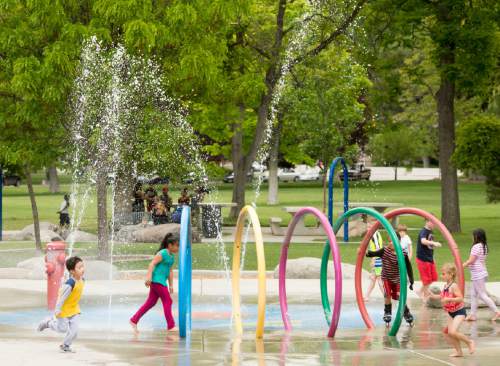This is an archived article that was published on sltrib.com in 2016, and information in the article may be outdated. It is provided only for personal research purposes and may not be reprinted.
The recession may be over, but times remain tough at City Hall.
Salt Lake City is in a budget bind that will continue to force the municipality to defer maintenance on streets, parks and facilities.
A lack of new revenue has hampered the City Council's attempts to massage Mayor Jackie Biskupski's $259 million General Fund budget. Adding to the quandary surrounding the essentially flat budget is that debt service on a separate Capital Improvement Program budget (CIP) will claim a substantial sum during the next four years.
Historically, CIP has been a source for maintenance funding. But its use is variable, and maintenance money often has given way to special projects.
Among the challenges, said Councilman Charlie Luke, is that putting off maintenance, particularly on streets, makes future upgrades more expensive.
"We have deferred maintenance in the city for so long," he said, "that it will take a long time to get to where we need to go."
The council must approve a balanced budget by June 22, and its members already are pondering a future that could include "new revenue streams," otherwise known as taxes.
Fiscal 2016-17 begins July 1. The budget for the current fiscal year, which ends June 30, is $256 million.
Potential new revenue includes property tax bumps and the "prison sales tax" option of 0.5 percent. That tax was tucked into legislation that set a deadline for a commission selecting a new site for the Utah State Prison, which is expected to be built on the western outskirts of Salt Lake City.
But neither the council nor the administration is willing to raise taxes without what a Biskupski spokesman called a "robust public discussion" on the matter.
The prison sales tax option is favored by some because it also would tax commuters and visitors who drive on city streets, use city parks and receive other municipal services.
Luke said he wants assurances that any new tax money for streets, parks and facilities would not be sidetracked.
Three years ago, the council, concerned about the condition of streets and parks, raised $8 million in property taxes. At least $4.6 million of that was earmarked for roads.
Then-Mayor Ralph Becker vetoed the increase, but the council overrode him.
The following year, however, Becker used that extra funding to give employees raises, even though the council believed its tax hike was set for streets and parks.
In this, her first budget, Biskupski has moved parks and facilities out of the CIP budget to ensure maintenance funding for those items. But in so doing, her proposed budget for parks and open space is slashed by 57 percent from the 2015-16 budget. Facilities maintenance is pared by 41 percent.
Those figures caused gasps from council members.
"This is more than a trim; this is like cutting the body in half," Councilwoman Erin Mendenhall said in a budget work session.
Later, in an interview, she said, "There is just not enough money in the current stream of funding to meet the city's needs."
The mayor's proposal boosts the streets budget from $9.6 million to $9.8 million. An additional $4 million in one-time funding from the state is dedicated to upgrades on 500 South and 600 South. Another $3.75 million of state funds will go through Salt Lake County for road improvements.
According to the city's engineering department, two-thirds of the capital's 1,855 miles of roadways are rated in poor to very poor condition. The municipality's seven-year street-maintenance program calls for $22.7 million annually — a target that hasn't been hit for a decade.
The council asked the administration for an inventory of street maintenance needs and priorities, said Councilman Stan Penfold. Such data, he said, will provide insight into how the city can catch up in coming years.
Penfold noted the council may ask for the same kind of information on parks and facilities.
"That would be incredibly important," he said. "Then we could have a serious conversation of a maintenance schedule that residents are willing to fund."
The councilman also applauded the mayor's strategy to move maintenance out of CIP and into the general fund. This will bring regular maintenance funding, he said.
Biskupski spokesman Matthew Rojas said budget cuts to parks and facilities were a necessity based on revenue for the upcoming year. But those departments are guaranteed the budgeted funding, rather than facing the steep cuts in the CIP process.
"This is a first step in dealing with deferred maintenance," he said, noting that the debt service in the CIP budget will nearly double through the next four years. "This is part of a larger conversation that will take place over the next year."
The council will continue budget discussions Tuesday at its regularly scheduled 1 p.m. work session at City Hall, 451 S. State.



